Femoston Conti 1 mg/5 mg Tablet 28's
MRP ₹1328
(Inclusive of all Taxes)
₹199.2 Cashback (15%)
Provide Delivery Location
Online payment accepted
 Prescription drug
Prescription drugWhats That
Composition :
Manufacturer/Marketer :
Consume Type :
Expires on or after :
Return Policy :
About Femoston Conti 1 mg/5 mg Tablet
Femoston Conti 1 mg/5 mg Tablet is a hormone replacement therapy (HRT) used to treat postmenopausal symptoms and prevent osteoporosis (weak and brittle bones) caused by menopause in women. Post-menopause is a condition in which women have not had a period for 12 months or more. During menopause, estrogen levels decrease, leading to hot flushes (feeling of heat over the face, neck, and chest). Women with menopause are at risk of developing osteoporosis (thinning of bones). Femoston Conti 1 mg/5 mg Tablet can be used to prevent osteoporosis after menopause. Osteoporosis is a bone disease that weakens and thins bones by decreasing bone density which is common in post-menopausal women.
Femoston Conti 1 mg/5 mg Tablet contains two female hormones, Estradiol and Dydrogesterone. Estradiol works by replacing the falling levels of estrogen in the body and thus helps to reduce menopause symptoms. Dydrogesterone works by reducing the overgrowth of the womb lining. Together, Femoston Conti 1 mg/5 mg Tablet helps treat postmenopausal symptoms and osteoporosis.
Femoston Conti 1 mg/5 mg Tablet should be taken as advised by your doctor. The dose of medicine and duration of treatment will be decided by the doctor based on your medical condition. Femoston Conti 1 mg/5 mg Tablet may cause certain side effects such as stomach pain, headache, breast pain or tenderness and back pain. Most of these side effects do not require medical attention and gradually resolve over time. However, if these side effects persist or worsen, please consult your doctor.
Femoston Conti 1 mg/5 mg Tablet should be avoided if you are allergic to it or if you have a history of breast cancer, endometrial cancer (cancer of the lining of the womb), unexplained vaginal bleeding, untreated endometrial hyperplasia (thickening of the womb lining), blood clotting disorder, heart attack or angina (chest pain), inherited porphyria (a blood disorder) or liver disease. It is not recommended for use in pregnant and breastfeeding women. Stop taking Femoston Conti 1 mg/5 mg Tablet and consult your doctor immediately if you develop jaundice (yellowing of the skin and eyes), high blood pressure and migraine-like headache, become pregnant or notice signs of a blood clot such as redness, swelling and pain in the legs, sudden chest pain or difficulty in breathing. Inform your doctor if you have any intolerance to sugar.
Uses of Femoston Conti 1 mg/5 mg Tablet
Directions for Use
Key Benefits
Femoston Conti 1 mg/5 mg Tablet contains Estradiol and Dydrogesterone used to treat postmenopausal symptoms and prevent osteoporosis (weak and brittle bones) caused by menopause in women. Estradiol restores the falling levels of estrogen in the body and thus helps to reduce menopause symptoms. Dydrogesterone decreases the overgrowth of the womb lining. Also, Femoston Conti 1 mg/5 mg Tablet is used as prophylaxis in preventing osteoporosis in postmenopausal women and prevents bone loss and fractures.
Storage
- Use hot or cold packs on your breasts to help alleviate discomfort.
- Choose a supportive, well-fitting bra, preferably one that has been professionally fitted.
- Practice relaxation techniques to manage stress and anxiety that may accompany severe breast pain.
- Limit or avoid caffeine consumption.
- Eat a low-fat diet and focus on foods rich in complex carbohydrates.
- Rubbing evening primrose oil on your breasts may help balance fatty acids in the cells and reduce pain.
- Keep track of when your breast pain occurs and any other symptoms to determine if the pain is regular or not.
- Vitamin E supplements may help reduce pain for women who experience pain linked to their menstrual cycle.
- Over-the-counter pain relievers like acetaminophen or ibuprofen can provide relief, but be sure to consult your doctor for the correct dosage, as prolonged use may cause side effects.
- Lie down or take a nap in dark and quiet room.
- To avoid dehydration, drink plenty of fluids.
- In case of mild to moderate migraine, you can take over-the-counter pain relievers like paracetamol or ibuprofen.
- Apply an ice pack or cool cloth on your forehead.
- Try relaxation techniques such as yoga, meditation, or deep breathing to reduce stress and relax.
- Avoid foods and drinks that trigger migraine such as chocolate, alcohol, cheese, caffeine, processed meats, artificial sweeteners and dried fruits.
- Manage your stress by eating healthy, exercising and a regular sleep schedule.
- Inform your doctor about dizziness symptoms. They may adjust your medication regimen or prescribe additional medications to manage symptoms.
- Follow your doctor's instructions for taking medication, and take it at the same time every day to minimize dizziness.
- When standing up, do so slowly and carefully to avoid sudden dizziness.
- Avoid making sudden movements, such as turning or bending quickly, which can exacerbate dizziness.
- Drink plenty of water throughout the day to stay hydrated and help alleviate dizziness symptoms.
- If you're feeling dizzy, sit or lie down and rest until the dizziness passes.
- Track when dizziness occurs and any factors that may trigger it, and share this information with your doctor to help manage symptoms.
- Prepare for a restful night's sleep: Develop a calming pre-sleep routine, like reading or meditation, to help your body relax and prepare for sleep.
- Create a sleep-conducive Environment: Make bedroom a sleep haven by ensuring it is quiet, dark and calm.
- Follow a Sleep Schedule: Go to bed and get up at the same time every day to help regulate your body's internal clock and increase sleep quality.
- Try relaxing techniques like deep breathing, mindfulness meditation and any others.
- Limit stimulating activities before bedtime: Avoid stimulating activities before bedtime to improve sleep quality.
- Monitor Progress: Keep track of your sleep patterns to identify areas for improvement.
- Consult a doctor if needed: If these steps don't improve your sleep, consult a doctor for further guidance and therapy.
- Remember, managing depression as a side effect of medication requires patience, persistence, and collaboration with your healthcare team.
- Tell your doctor about your depression symptoms to adjust medication.
- Consult a therapist or counsel for emotional support.
- Engage in regular exercise to release endorphins (neurotransmitters).
- Practice stress-reducing techniques like meditation and deep breathing.
- Build a support network of friends, family, and support groups.
- Establish a consistent sleep schedule.
- Eat a nutritious diet rich in fruits, vegetables, and whole grains.
- Limit or avoid alcohol and recreational substances.
- Keep a mood journal to track symptoms and progress.
- Take medications with food (if recommended): It can help prevent stomach distress and indigestion.
- Eat smaller, more frequent meals: Divide daily food intake into smaller, more frequent meals to ease digestion.
- Avoid trigger foods: Identify and avoid foods that trigger indigestion, such as spicy, fatty, or acidic foods.
- Stay upright after eating: Sit or stand upright for at least 1-2 hours after eating to prevent stomach acid from flowing into the oesophagus.
- Avoid carbonated drinks: Avoid drinking carbonated beverages, such as soda or beer, which can worsen indigestion.
- Manage stress: To alleviate indigestion, engage in stress-reducing activities like deep breathing exercises or meditation.
- Consult a doctor if needed: If indigestion worsens or persists, consult a healthcare professional to adjust the medication regimen or explore alternative treatments.
Drug Warnings
Before starting treatment with Femoston Conti 1 mg/5 mg Tablet , inform your doctor if you are allergic to it. Avoid taking Femoston Conti 1 mg/5 mg Tablet if you are pregnant or breastfeeding. Femoston Conti 1 mg/5 mg Tablet is not recommended for children. If you have premature menopause, inform your doctor before taking Femoston Conti 1 mg/5 mg Tablet so that the risks and benefits may be compared. Avoid taking Femoston Conti 1 mg/5 mg Tablet if you have recently had a stroke, heart attack or angina (chest pain), liver disease and untreated endometrial hyperplasia (thickening of the womb lining). If you have very high levels of fat (triglycerides) in your blood, inform your doctor before taking Femoston Conti 1 mg/5 mg Tablet . You are recommended to avoid alcohol consumption with Femoston Conti 1 mg/5 mg Tablet as it may increase the risk of breast cancer. If you experience sudden chest pain, difficulty breathing, or painful swelling and redness of your legs, stop taking Femoston Conti 1 mg/5 mg Tablet and consult a doctor immediately, as these might be signs of a blood clot. Long-term use and high dosages of this medication may raise your risk of heart attack, stroke, blood clots, breast cancer, or uterine cancer. Hence discuss this risk with your doctor before taking Femoston Conti 1 mg/5 mg Tablet .
Drug-Drug Interactions
Drug-Drug Interactions
Login/Sign Up
When Etodolac is taken with Bivalirudin, the risk or severity of bleeding and haemorrhage increases.
How to manage the interaction:
Taking Bivalirudin with Femoston Conti 1 mg/5 mg Tablet can cause an interaction, consult a doctor before taking it. Do not discontinue any medications without a doctor's advice.
The usage of Femoston Conti 1 mg/5 mg Tablet with dantrolene might have significant adverse effects on your liver.
How to manage the interaction:
Taking Femoston Conti 1 mg/5 mg Tablet with Dantrolene together can result in an interaction, but it can be taken if a doctor has advised it. However, if you have a fever, chills, joint pain or swelling, severe fatigue or weakness, unusual bleeding or bruising, skin rash or itching, lack of appetite, nausea, vomiting, or yellowing of the skin or whites of your eyes, consult the doctor immediately. Do not discontinue any medications without consulting a doctor.
Letrozole may have a negative effect when used with Femoston Conti 1 mg/5 mg Tablet, making it less effective in treating your disease.
How to manage the interaction:
Although taking Letrozole and Femoston Conti 1 mg/5 mg Tablet together can result in an interaction, it can be taken if a doctor has prescribed it. Do not discontinue any medications without a doctor's advice.
Coadministration of Femoston Conti 1 mg/5 mg Tablet and Lenalidomide can increase the risk of blood clots.
How to manage the interaction:
Although there is an interaction between lenalidomide and Femoston Conti 1 mg/5 mg Tablet, it can be taken if your doctor has advised it. However, if you experience chest pain, shortness of breath, difficulty breathing, coughing up blood, sudden loss of vision, pain, redness or swelling in an arm or leg, and numbness or weakness on one side of the body, contact your doctor immediately. Do not discontinue any medications without consulting a doctor.
Femoston Conti 1 mg/5 mg Tablet may interfere with anastrozole's function and make it less effective in treating your condition.
How to manage the interaction:
Co-administration of Anastrozole with Femoston Conti 1 mg/5 mg Tablet can result in an interaction, but it can be taken if a doctor has advised it. Do not stop using any medications without a doctor's advice.
Co-administration of Femoston Conti 1 mg/5 mg Tablet and Pomalidomide can increase the risk of serious blood clots.
How to manage the interaction:
There may be a possibility of interaction between Femoston Conti 1 mg/5 mg Tablet and Pomalidomide, but it can be taken if prescribed by a doctor. However, if you experience symptoms like chest pain, difficulty breathing, coughing up blood, sudden loss of vision, pain, redness, or swelling in an arm or leg, or numbness or weakness on one side of the body, consult a doctor immediately. Do not discontinue any medications without a doctor's advice.
Using Femoston Conti 1 mg/5 mg Tablet with Exemestane may interfere with Exemestane's activity and make it less effective in treating the condition.
How to manage the interaction:
Although there is a possible interaction between Exemestane and Femoston Conti 1 mg/5 mg Tablet, you can take these medicines together if prescribed by a doctor. Do not stop using any medications without talking to a doctor.
When taken in combination, clindamycin can lower the amount or action of Femoston Conti 1 mg/5 mg Tablet.
How to manage the interaction:
Co-administration of Femoston Conti 1 mg/5 mg Tablet with Clindamycin can result in an interaction, but it can be taken if a doctor has advised it. Do not stop using any medications without a doctor's advice.
Co-administration of Femoston Conti 1 mg/5 mg Tablet with Tranexamic acid can increase the risk of blood clots.
How to manage the interaction:
Taking Femoston Conti 1 mg/5 mg Tablet with Tranexamic acid can lead to an interaction; however, it can be taken only if a doctor has advised it. If you experience symptoms such as chest pain, shortness of breath, difficulty breathing, coughing up blood, sudden loss of vision, pain, and numbness or weakness on one side of the body contact a doctor immediately. Do not discontinue any medications without consulting a doctor.
Taking thalidomide together with Femoston Conti 1 mg/5 mg Tablet may increase the risk of blood clots and other complications.
How to manage the interaction:
Although taking Femoston Conti 1 mg/5 mg Tablet and thalidomide together can result in an interaction, it can be taken if a doctor has prescribed it. However, consult the doctor immediately if you experience symptoms such as chest pain, shortness of breath, difficulty breathing, coughing up blood, sudden loss of vision, pain, redness or swelling in an arm or leg, and numbness or weakness on one side of the body. Do not discontinue any medications without consulting a doctor.
Drug-Food Interactions
Drug-Food Interactions
Login/Sign Up
Diet & Lifestyle Advise
- Wear loose, layered clothing during the nighttime, especially in warm weather. This prevents hot flushes.
- Manage your weight. Shed excess weight by exercising regularly if you are obese or overweight.
- Talk to a psychologist if you feel low, sad, isolated, or have sleeping issues.
- Limit alcohol intake and quit smoking.
-
Try to eat foods that are rich in iron and Vitamin C, including red meat, shellfish, eggs, beans, and leafy green vegetables.
Side Effects of Femoston Conti 1 mg/5 mg Tablet
- Stomach pain
- Headache
- Breast pain or tenderness
- Back pain
- Changes in your menstrual periods
- Nausea
Habit Forming
Therapeutic Class
All Substitutes & Brand Comparisons
Author Details
We provide you with authentic, trustworthy and relevant information
Drug-Diseases Interactions
Drug-Diseases Interactions
Login/Sign Up
FAQs
Femoston Conti 1 mg/5 mg Tablet contains two female hormones, Estradiol and Dydrogesterone. Estradiol works by replacing the falling levels of estrogen in the body and thus helps to reduce menopause symptoms. Dydrogesterone works by reducing the overgrowth of the womb lining. Also, Femoston Conti 1 mg/5 mg Tablet is used as prophylaxis in preventing postmenopausal osteoporosis.
Femoston Conti 1 mg/5 mg Tablet is not a contraceptive. Femoston Conti 1 mg/5 mg Tablet is a hormone replacement therapy. Therefore, if you are less than 50 years old or if it is less than 12 months since your last period, you are advised to use additional contraceptive measures to avoid pregnancy. However, discuss with a doctor if you have any concerns regarding this.
Femoston Conti 1 mg/5 mg Tablet may cause irregular bleeding or spotting (drops of blood) during the first 3 to 6 months of taking Femoston Conti 1 mg/5 mg Tablet . However, if the bleeding or spotting continues for more than six months or after discontinuing Femoston Conti 1 mg/5 mg Tablet , please consult a doctor immediately.
Drug-Drug Interactions Checker List
- PHENYTOIN
- CARBAMAZEPINE
- PHENOBARBITAL
- RIFAMPICIN
- EFAVIRENZ
- RITONAVIR
- FENTANYL
- THEOPHYLLINE
- CYCLOSPORINE
Special Advise
- Regular breast screening is recommended while taking Femoston Conti 1 mg/5 mg Tablet .
- Check your breasts regularly for any changes in the nipple, dimpling of the skin or any lumps.
- While giving blood for tests, inform your doctor that you are taking Femoston Conti 1 mg/5 mg Tablet as this medicine may affect some test results.
Disease/Condition Glossary
Post menopause: Menopause occurs when a woman is between 45 and 55 and has not had a period for 12 months or more. Post-menopause is a condition in which women have not had a period for 12 months or longer. The oestrogen levels decrease in postmenopausal women resulting in symptoms such as hot flushes (hot neck, face and chest).
Osteoporosis: It is a bone disease that weakens and thins bones by decreasing bone density. As the density of bones decreases, they weaken and are more likely to break. Post-menopausal women are more likely to develop osteoporosis than men because, at menopause, a woman’s ovaries stop the production of oestrogen (a female hormone), which is essential to keep bones healthy. Following menopause, bone loss occurs, making bones weak and more likely to break. Signs and symptoms include back pain caused by a fractured or collapsed vertebra, loss of height over time, a stooped posture, and a bone that breaks much more easily than expected.

Have a query?
Alcohol
Safe if prescribed
Avoid consumption of alcohol with Femoston Conti 1 mg/5 mg Tablet as it may increase the risk of breast cancer and delay healing.
Pregnancy
Consult your doctor
Femoston Conti 1 mg/5 mg Tablet is only recommended for postmenopausal women. Therefore, consult a doctor if you are pregnant.
Breast Feeding
Consult your doctor
It is not recommended for use in breastfeeding. Hence, inform your doctor before taking Femoston Conti 1 mg/5 mg Tablet if you are breastfeeding. Your doctor may suggest you stop feeding while on treatment with this medicine.
Driving
Safe if prescribed
Femoston Conti 1 mg/5 mg Tablet may not affect your ability to drive.
Liver
Consult your doctor
Femoston Conti 1 mg/5 mg Tablet should not be used in patients with liver diseases. Inform your doctor if you have/had a history of liver disease before starting treatment with this medicine.
Kidney
Consult your doctor
Femoston Conti 1 mg/5 mg Tablet should be used with caution in patients with severe kidney diseases. Hence, if you have a pre-existing or a history of kidney disease, inform your doctor before taking Femoston Conti 1 mg/5 mg Tablet . Your doctor may adjust the dose or prescribe a suitable alternative based on your condition.
Children
Safe if prescribed
Femoston Conti 1 mg/5 mg Tablet is recommended for use in post-menopause women.
Recommended for a 30-day course: 4 Strips

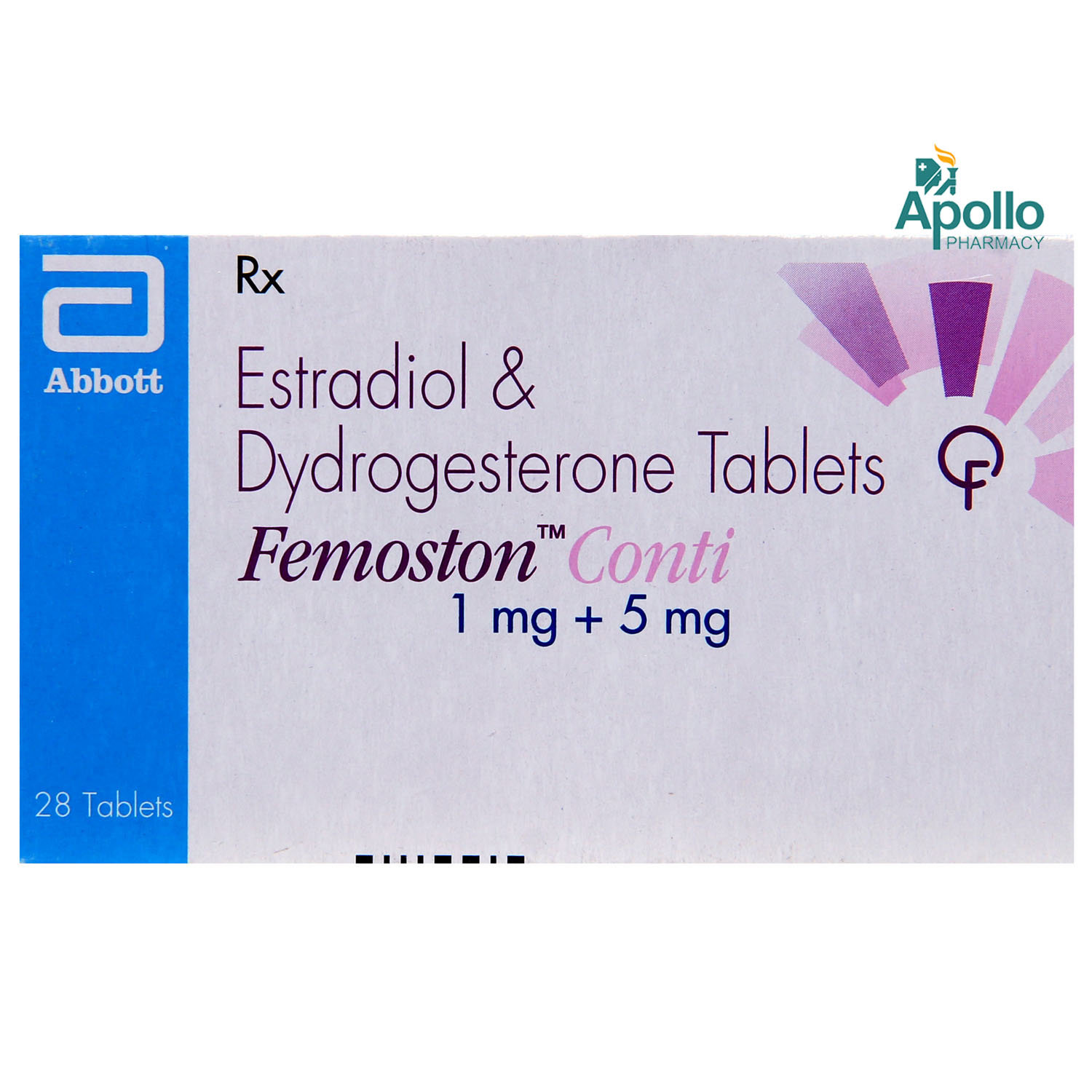
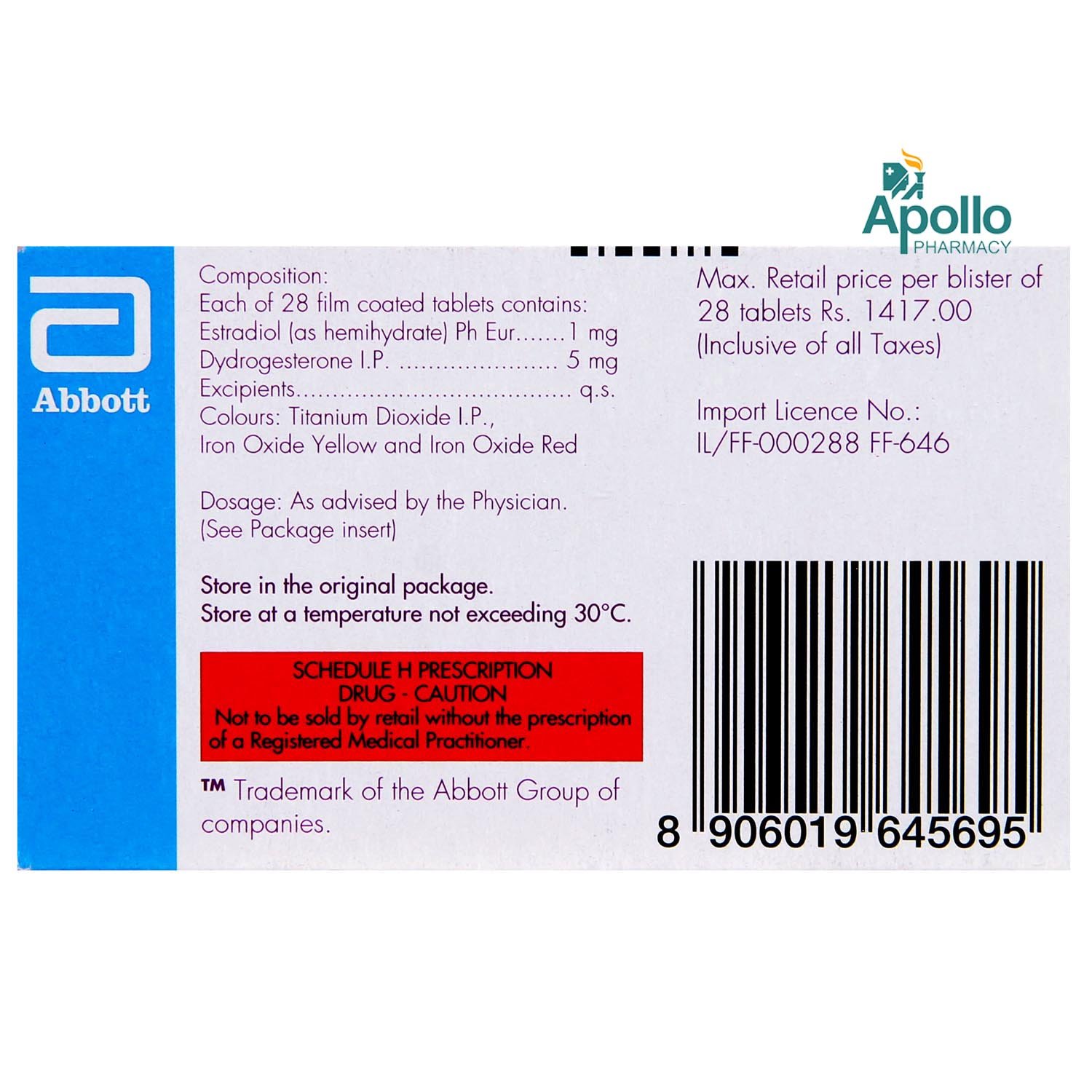
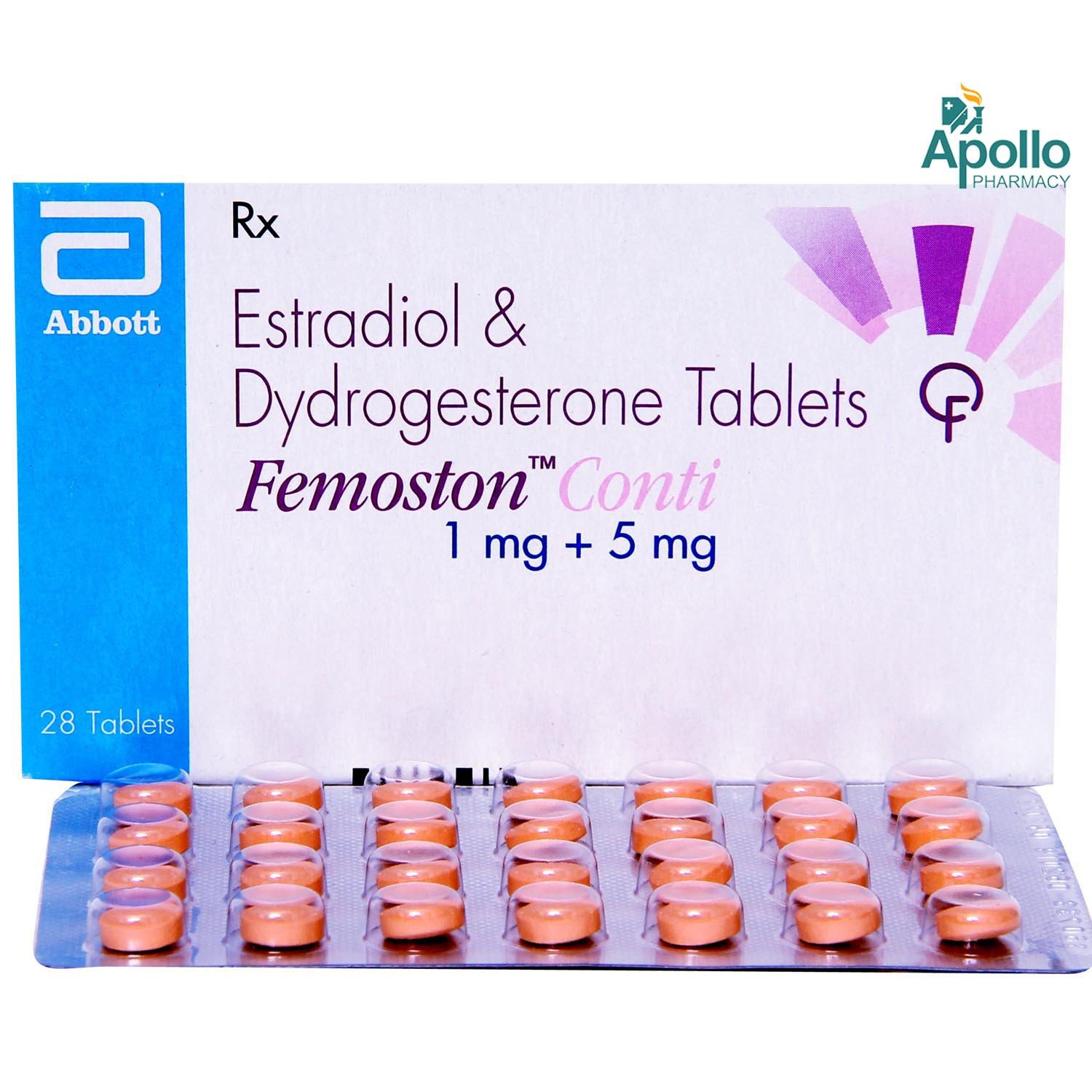
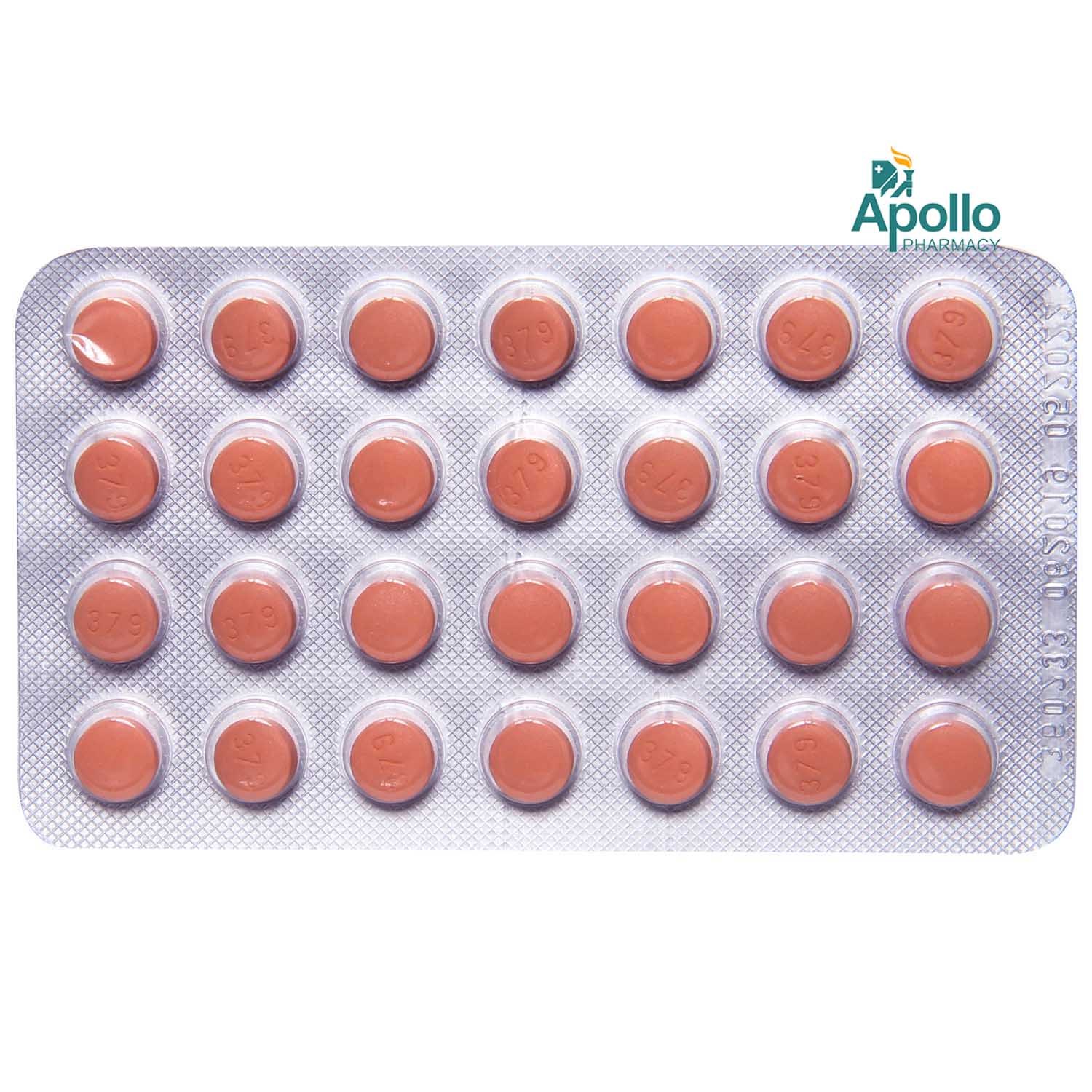
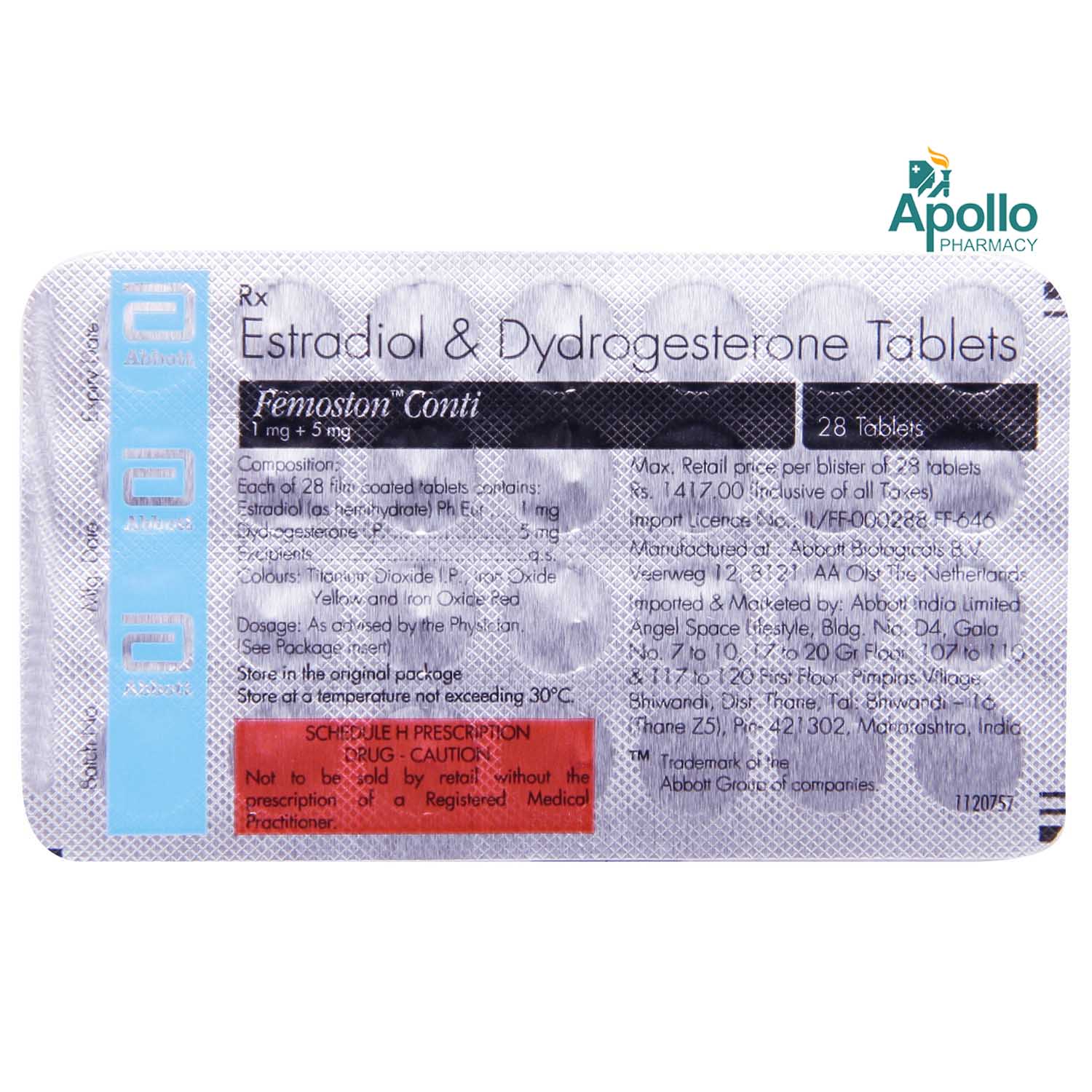







.jpg?tr=q-85)

